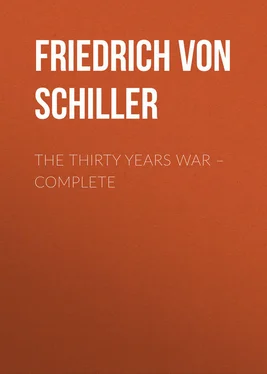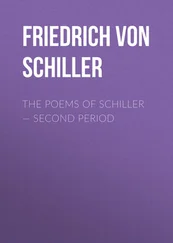Friedrich Schiller - The Thirty Years War – Complete
Здесь есть возможность читать онлайн «Friedrich Schiller - The Thirty Years War – Complete» — ознакомительный отрывок электронной книги совершенно бесплатно, а после прочтения отрывка купить полную версию. В некоторых случаях можно слушать аудио, скачать через торрент в формате fb2 и присутствует краткое содержание. Жанр: История, literature_18, foreign_antique, foreign_prose, на английском языке. Описание произведения, (предисловие) а так же отзывы посетителей доступны на портале библиотеки ЛибКат.
- Название:The Thirty Years War – Complete
- Автор:
- Жанр:
- Год:неизвестен
- ISBN:нет данных
- Рейтинг книги:5 / 5. Голосов: 1
-
Избранное:Добавить в избранное
- Отзывы:
-
Ваша оценка:
- 100
- 1
- 2
- 3
- 4
- 5
The Thirty Years War – Complete: краткое содержание, описание и аннотация
Предлагаем к чтению аннотацию, описание, краткое содержание или предисловие (зависит от того, что написал сам автор книги «The Thirty Years War – Complete»). Если вы не нашли необходимую информацию о книге — напишите в комментариях, мы постараемся отыскать её.
The Thirty Years War – Complete — читать онлайн ознакомительный отрывок
Ниже представлен текст книги, разбитый по страницам. Система сохранения места последней прочитанной страницы, позволяет с удобством читать онлайн бесплатно книгу «The Thirty Years War – Complete», без необходимости каждый раз заново искать на чём Вы остановились. Поставьте закладку, и сможете в любой момент перейти на страницу, на которой закончили чтение.
Интервал:
Закладка:
A momentary lull now pervaded the empire; a transitory bond of concord appeared to unite its scattered limbs into one body, so that for a time a feeling also for the common weal returned. But the division had penetrated its inmost being, and to restore its original harmony was impossible. Carefully as the treaty of peace appeared to have defined the rights of both parties, its interpretation was nevertheless the subject of many disputes. In the heat of conflict it had produced a cessation of hostilities; it covered, not extinguished, the fire, and unsatisfied claims remained on either side. The Romanists imagined they had lost too much, the Protestants that they had gained too little; and the treaty which neither party could venture to violate, was interpreted by each in its own favour.
The seizure of the ecclesiastical benefices, the motive which had so strongly tempted the majority of the Protestant princes to embrace the doctrines of Luther, was not less powerful after than before the peace; of those whose founders had not held their fiefs immediately of the empire, such as were not already in their possession would it was evident soon be so. The whole of Lower Germany was already secularized; and if it were otherwise in Upper Germany, it was owing to the vehement resistance of the Catholics, who had there the preponderance. Each party, where it was the most powerful, oppressed the adherents of the other; the ecclesiastical princes in particular, as the most defenceless members of the empire, were incessantly tormented by the ambition of their Protestant neighbours. Those who were too weak to repel force by force, took refuge under the wings of justice; and the complaints of spoliation were heaped up against the Protestants in the Imperial Chamber, which was ready enough to pursue the accused with judgments, but found too little support to carry them into effect. The peace which stipulated for complete religious toleration for the dignitaries of the Empire, had provided also for the subject, by enabling him, without interruption, to leave the country in which the exercise of his religion was prohibited. But from the wrongs which the violence of a sovereign might inflict on an obnoxious subject; from the nameless oppressions by which he might harass and annoy the emigrant; from the artful snares in which subtilty combined with power might enmesh him – from these, the dead letter of the treaty could afford him no protection. The Catholic subject of Protestant princes complained loudly of violations of the religious peace – the Lutherans still more loudly of the oppression they experienced under their Romanist suzerains. The rancour and animosities of theologians infused a poison into every occurrence, however inconsiderable, and inflamed the minds of the people. Happy would it have been had this theological hatred exhausted its zeal upon the common enemy, instead of venting its virus on the adherents of a kindred faith!
Unanimity amongst the Protestants might, by preserving the balance between the contending parties, have prolonged the peace; but as if to complete the confusion, all concord was quickly broken. The doctrines which had been propagated by Zuingli in Zurich, and by Calvin in Geneva, soon spread to Germany, and divided the Protestants among themselves, with little in unison save their common hatred to popery. The Protestants of this date bore but slight resemblance to those who, fifty years before, drew up the Confession of Augsburg; and the cause of the change is to be sought in that Confession itself. It had prescribed a positive boundary to the Protestant faith, before the newly awakened spirit of inquiry had satisfied itself as to the limits it ought to set; and the Protestants seemed unwittingly to have thrown away much of the advantage acquired by their rejection of popery. Common complaints of the Romish hierarchy, and of ecclesiastical abuses, and a common disapprobation of its dogmas, formed a sufficient centre of union for the Protestants; but not content with this, they sought a rallying point in the promulgation of a new and positive creed, in which they sought to embody the distinctions, the privileges, and the essence of the church, and to this they referred the convention entered into with their opponents. It was as professors of this creed that they had acceded to the treaty; and in the benefits of this peace the advocates of the confession were alone entitled to participate. In any case, therefore, the situation of its adherents was embarrassing. If a blind obedience were yielded to the dicta of the Confession, a lasting bound would be set to the spirit of inquiry; if, on the other hand, they dissented from the formulae agreed upon, the point of union would be lost. Unfortunately both incidents occurred, and the evil results of both were quickly felt. One party rigorously adhered to the original symbol of faith, and the other abandoned it, only to adopt another with equal exclusiveness.
Nothing could have furnished the common enemy a more plausible defence of his cause than this dissension; no spectacle could have been more gratifying to him than the rancour with which the Protestants alternately persecuted each other. Who could condemn the Roman Catholics, if they laughed at the audacity with which the Reformers had presumed to announce the only true belief? – if from Protestants they borrowed the weapons against Protestants? – if, in the midst of this clashing of opinions, they held fast to the authority of their own church, for which, in part, there spoke an honourable antiquity, and a yet more honourable plurality of voices. But this division placed the Protestants in still more serious embarrassments. As the covenants of the treaty applied only to the partisans of the Confession, their opponents, with some reason, called upon them to explain who were to be recognized as the adherents of that creed. The Lutherans could not, without offending conscience, include the Calvinists in their communion, except at the risk of converting a useful friend into a dangerous enemy, could they exclude them. This unfortunate difference opened a way for the machinations of the Jesuits to sow distrust between both parties, and to destroy the unity of their measures. Fettered by the double fear of their direct adversaries, and of their opponents among themselves, the Protestants lost for ever the opportunity of placing their church on a perfect equality with the Catholic. All these difficulties would have been avoided, and the defection of the Calvinists would not have prejudiced the common cause, if the point of union had been placed simply in the abandonment of Romanism, instead of in the Confession of Augsburg.
But however divided on other points, they concurred in this – that the security which had resulted from equality of power could only be maintained by the preservation of that balance. In the meanwhile, the continual reforms of one party, and the opposing measures of the other, kept both upon the watch, while the interpretation of the religious treaty was a never-ending subject of dispute. Each party maintained that every step taken by its opponent was an infraction of the peace, while of every movement of its own it was asserted that it was essential to its maintenance. Yet all the measures of the Catholics did not, as their opponents alleged, proceed from a spirit of encroachment – many of them were the necessary precautions of self-defence. The Protestants had shown unequivocally enough what the Romanists might expect if they were unfortunate enough to become the weaker party. The greediness of the former for the property of the church, gave no reason to expect indulgence; – their bitter hatred left no hope of magnanimity or forbearance.
But the Protestants, likewise, were excusable if they too placed little confidence in the sincerity of the Roman Catholics. By the treacherous and inhuman treatment which their brethren in Spain, France, and the Netherlands, had suffered; by the disgraceful subterfuge of the Romish princes, who held that the Pope had power to relieve them from the obligation of the most solemn oaths; and above all, by the detestable maxim, that faith was not to be kept with heretics, the Roman Church, in the eyes of all honest men, had lost its honour. No engagement, no oath, however sacred, from a Roman Catholic, could satisfy a Protestant. What security then could the religious peace afford, when, throughout Germany, the Jesuits represented it as a measure of mere temporary convenience, and in Rome itself it was solemnly repudiated.
Читать дальшеИнтервал:
Закладка:
Похожие книги на «The Thirty Years War – Complete»
Представляем Вашему вниманию похожие книги на «The Thirty Years War – Complete» списком для выбора. Мы отобрали схожую по названию и смыслу литературу в надежде предоставить читателям больше вариантов отыскать новые, интересные, ещё непрочитанные произведения.
Обсуждение, отзывы о книге «The Thirty Years War – Complete» и просто собственные мнения читателей. Оставьте ваши комментарии, напишите, что Вы думаете о произведении, его смысле или главных героях. Укажите что конкретно понравилось, а что нет, и почему Вы так считаете.











